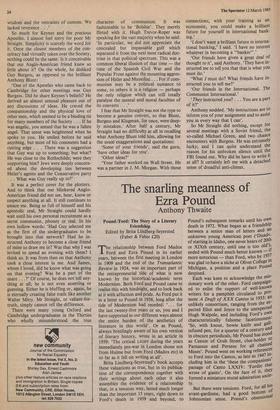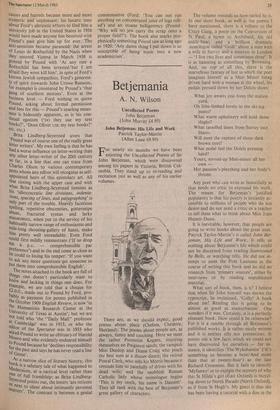The snarling meanness of Ezra Pound
Anthony Thwaite
Pound/Ford: The Story of a Literary Friendship Edited by Brita Lindberg-Seyersted (Faber & Faber £20) The relationship between Ford Madox Ford and Ezra Pound in its earlier years, between the first meeting in London in 1909 and the end of the Transatlantic Review in 1924, was an important part of the entrepreneurial side of what is now known by the historical/academic term Modernism. Both Ford and Pound came to realise this with hindsight, and to look back at it with affection and pride. As Ford put it in a letter to Pound in 1938, long after the tide of Modernism had receded: ... for the last twenty-five years or so, you and I have supported in our different ways almost the entire burden of the aesthetics of literature in this world'. Or as Pound, always bristlingly aware of his own version of literary history, wrote in an article in 1939: 'The critical LIGHT during the years immediately pre-war in London shone not from Hulme but from Ford (Madox etc) in so far as it fell on writing at all'.
Brita Lindberg-Seyersted's book accepts these valuations as true, but in its publica- tion of the correspondence together with their writings about each other it also assembles the evidence of a relationship that, in a tenuous way, lasted much longer than the important 15 years, right down to Ford's death in 1939 and beyond, to
Pound's subsequent remarks until his own death in 1972. What began as a friendship between a senior man of letters and an unknown young American poet (`Disadv of starting in Idaho, one never hears of 20th or XIXth century, until one is too oldl, ended with Pound much better known — if more notorious — than Ford, who by 1937 was glad to have a niche at Olivet College in Michigan, a position and a place Pound despised. Each was keen to acknowledge the mis- sionary work of the other. Ford campaign' ed to enlist the support of well-known writers for a pamphlet circulated to pro- mote A Draft of XXX Cantos in 1933: an unlikely consortium, ranging from the ex- pected Eliot and Joyce to the unexpected Hugh Walpole, and including Ford's own characteristically fulsome facetiousness: `So, with knout, bowie knife and gall- infused pen, for a quarter of a century and in obscure periodicals, Mr Pound has stood as Censor of Grub Street, clue-holder to Parnassus and Perseus for all chained Muses'. Pound went on working references to Ford into the Cantos, as late as 1947 in- eluding him in the 'these the companions' passage of Canto LXXIV: 'Fordie that wrote of giants'. On the face of it, they formed a miniature mutal admiration socie- ty.
But there were tensions. Ford, for all his avant-gardisme, had a good bottom of Johnsonian sense. Pound's obsessional
causes and hatreds became more and more eccentric and unpleasant; his lunatic tone about Ford's altruistic efforts to find him a university job in the United States in 1938 would have made anyone less besotted with Pound's past give him up for ever. The anti-semitism became paranoid: the arrest of Louis de Rothschild by the Nazis when they entered Vienna in March 1938 is greeted by Pound with `At any rate a Rothschild has been arrested/but I am afraid they wont kill him', in spite of Ford's known Jewish sympathies. Ford's generosi- ty of spirit (towards John Crowe Ransom, for example) is countered by Pound's 'that gang of southern morons'. Even at the business level — Ford wishing to quote Pound, asking about formal permission and fees for this — Pound's snarling mean- ness is hideously apparent, as is his con- tinual egotism Coo they use my text books?', 'Does Olivet USE my text books?' etc. etc.) Brita Lindberg-Seyersted avers that `Pound was of course one of the really great letter writers'. My own feeling is that he has had a worse influence on letter-writing than any other letter-writer of the 20th century so far, in a line that one can trace from Charles Olson to various contemporary Pests whom any editor will recognise as self- appointed heirs of this epistolary art. All that rioting with the upper case and with what Brita Lindberg-Seyersted itemises as his 'idiosyncratic line divisions, indenta- tions, spacing of lines, and paragraphing' is Only part of the trouble. Heavily facetious spelling, repetitive obscenities, guttersnipe abuse, fractured syntax and larky Macaronies, when put to the service of his habitually narrow range of enthusiasms and mile-long shooting-gallery of hates, make him pretty well unreadable. Even Ford could first mildly remonstrate (If so drop me a p.c. — comprehensible par Preference') and in the end come as close as he could to losing his temper: 'If you want to ask any more questions .get someone to Put them into comprehensible English'.
The notes attached to the book are full of
know and one doesn't particularly want to 'now and lacking in things one does. For example, we are told that a cheque for f2.0.0., made out to Pound by Ford, pro- bably as payment for poems published in the October 1909 English Review, is now 'in the Humanities Research Center at the university of Texas at Austin'; but we are not told who 'the "Daily Mail" professor at Cambridge' was in 1913, or who the editor of the Spectator was in 1933 who asked Pound to write an obituary of Harold Monro and who evidently endeared himself to Pound because he 'declines responsibility for the past and says he has never read a line of Gosse.
As a narrow slice of literary history, this book is a salutary tale of what happened to Modernism, at a% tactical level rather than one of full friendship: as Brita Lindberg- eYersted points out, the letters 'are reticent err: next to silent about intimately personal atters'. The contrast is between a genial commonsense (Ford: 'You can not run anything on concentrated juice of logs roll- ed') and an insane belligerency (Pound: `Why will NO jew carry the scrap onto a proper field?'). The book also marks pro- phetically something Pound saw as long ago as 1920: 'Any damn thing I ptit down is so susceptible of being made into a new academicism'.











































 Previous page
Previous page